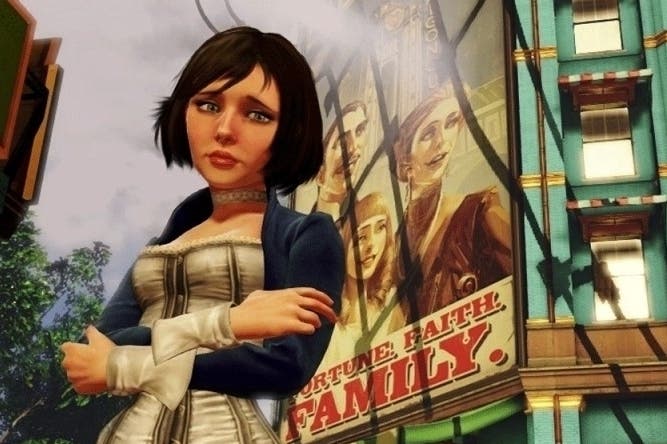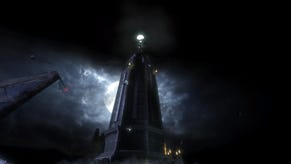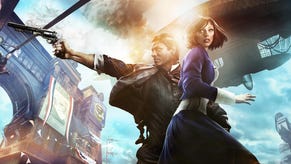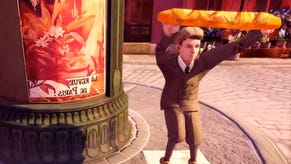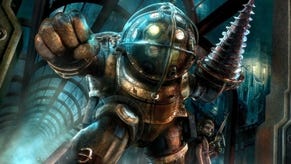How to write BioShock Infinite
Mixing brains and headshots.
Every generalisation has its limits, but this one I'm going to risk: big-budget FPS games have terrible stories. One of the honourable exceptions is the work of Irrational Games, with a legacy that stretches back over a decade to 1999's System Shock 2. The twist in 2007's BioShock still, for my money, stands as the greatest 'wow' moment a shooter has pulled, and its combination (conspiracy?) of player mechanics as part of that narrative climax is - regardless of what comes afterwards - simply brilliant. So BioShock Infinite's story has a lot to live up to, even if it is in capable hands: Ken Levine, writer/creative director, alongside Irrational's in-house writer Drew Holmes.
Rapture and Columbia make these games special; huge, coherent worlds faithful to their own internal logic, that are simply a delight to burrow into. I begin by asking Levine about the dialect of Columbia - a place that, initially at least, feels much less hostile than Rapture. "BioShock has a kind of slang to it," says Levine. "The patois of Rapture, how people speak in that place, and Columbia is more of a period piece. There's a formula there where if you read correspondence from the period it's a lot more formal than it is now. That's certainly not to say people were - like, I did some research and the term 'motherf***er' appears in a court record in the 1870s. It's not like Sam Jackson came up with that, you know? So people were using all kinds of language back then, but it's all about what makes the game feel right and feel real." So less of the vulgarity? "Well you use every word for a purpose - every single word matters," says Levine. "A lot of the enemies in Infinite at one point had a lot of cursing, a lot of 'f***s' in their language, but not now - where BioShock has a lot of that kind of language. It's not because I changed my view on that kind of language, it just didn't fit with what we were doing this time. We cut a lot of the words because it felt like it was fighting the rest of the world."
Columbia is a setting that both Holmes and Levine bring back, at most opportunities, to Elizabeth. "We've set our sights on creating an intimate character-driven piece framed in this larger action world," explains Holmes, "but having a character like Elizabeth to really draw the player in - our hope is that they feel a very strong emotional connection to her, and that for us was the thing that no-one's ever really being able to hit."
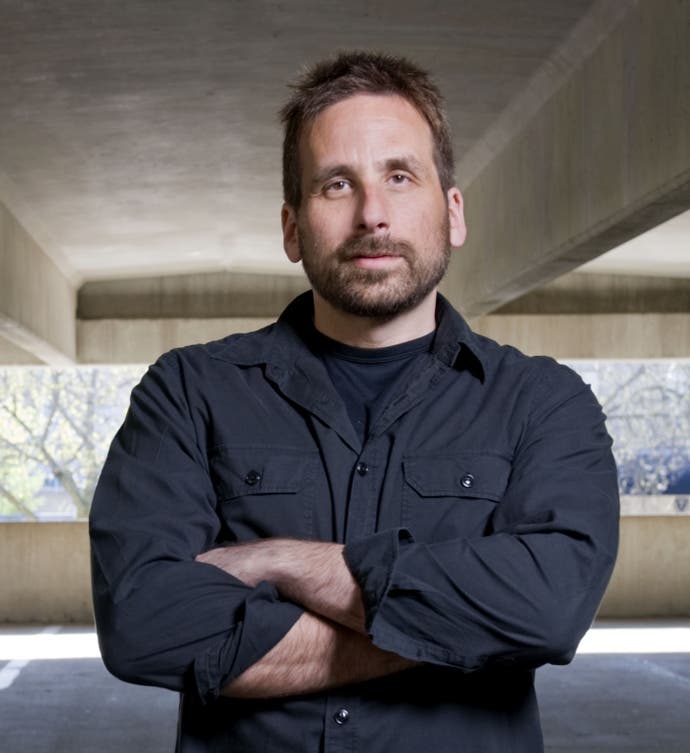
It would be no exaggeration to say that BioShock Infinite's success or otherwise depends on whether Elizabeth manages to charm the vast majority of players - one hell of a job, but she's won me over at least. "She's endearing, right?" says Holmes. "She's funny, she's empathetic towards Booker, she has a very specific view of the world, a lot of that having to do with her being locked away in this tower for all of her life. And she has a very specific goal. And that for me is sort of the key that makes Elizabeth different than most other NPCs in videogames, more interesting - she has an actual goal in the story, and it's not to help the main character win the game. I think that's honestly what makes her much more human from the start."
Does that mean you write for her like a player character? "It's just like you're writing for the main character," says Holmes, "but at the same time she isn't necessarily driving along the story - the player is. So you have to make sure that they understand what her goals are the entire time, otherwise she's just static and following along. The moment, like Ken was saying before, you turn to her and look and she's not acting like you'd expect someone to act, no-one cares anymore and no-one's interested anymore. You're just playing a video game."
It's time to move onto the world: the floating city and seceded state of Columbia. When Infinite was announced Levine described Columbia to Oli as being like sipping lemonade on the porch on the Fourth of July, a tremendously appealing image. The fact it's a kind of romanticised ideal doesn't matter, and this is an interesting thing about Levine's games; they're not history in any sense, yet they're made up of all these bits of history.
"I think it's very easy and very compelling to romanticise the past," says Levine, "and to some degree the iconisation of the founding fathers both in reality and in the game is the perfect example of that. Someone like Churchill might be an equivalent figure in England, and he's a complicated man - a colonialist, in a lot of ways a very dark figure but also a heroic figure, a complex individual."
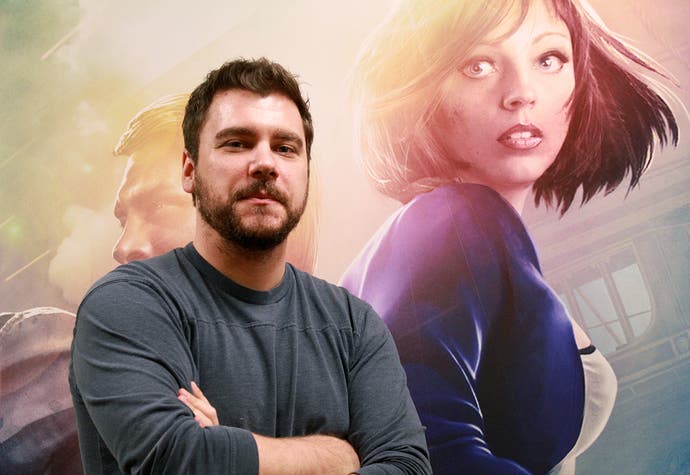
"You look at history in our time," continues Levine. "There's a lot of people who believe in this ideal thing in the past and you wanna go back to that, and in some ways that's true - all you need to do is go to a nice country village and spend a night there, with no artificial lights and looking at the stars, to understand there's something very appealing about that. On the other hand, in turn of the century America there's racism and terrible living conditions, not to mention polio, and if you caught syphilis you were dead, and pollution, baby remedies with cocaine and heroin in them.
"You smooth over the parts that are unpleasant. People watch some medieval story with these beautiful people and of course most of them should have horrible pox scars, that beautiful young couple should have teeth falling out of their head. Once you know history it's hard to wholly romanticise things in your head - who wouldn't want to see some of that stuff, of course, and by doing things like this we can maybe push some of that and have that lemonade moment. But we also want to say that it wasn't as simple as people remember."
One particular undercurrent interests me in relation to this - Booker's past with Wounded Knee. How far do you go with something as dark as that? "Booker is quite a dark figure and you sort of have to balance how much you..." Levine trails off a little. "I guess if you really wanted to dig into Wounded Knee then there's the notion of the helplessness of the defenceless Indians - there's a larger context to Wounded Knee, so the murders there were against women and children, and defenceless people who had been f***ed with for so many years. And as you - his reasoning for that, you find, there is some very off-the-beaten-path data you find that gives some background on what happened at Wounded Knee. It's not on the 'A' path, it's something for the real diggers that will give a really interesting take on it."
There are words describing many types of narrative, but I struggle to think of one that exactly fits the way BioShock and BioShock Infinite do things like this - in the way they present ideas and situations that you can infer conclusions from, and interact with, but never quite give you every jigsaw piece. Even finding what there is, and there's a lot, is a mammoth task, and fitting it all together yourself is what makes Rapture feel so personal. There is one single, solitary audio log I've never found in multiple playthroughs of BioShock, and I refuse to look up where it is. It's interesting and rare when a game feels like you own a little bit of it, even if it's just a question of interpretation.
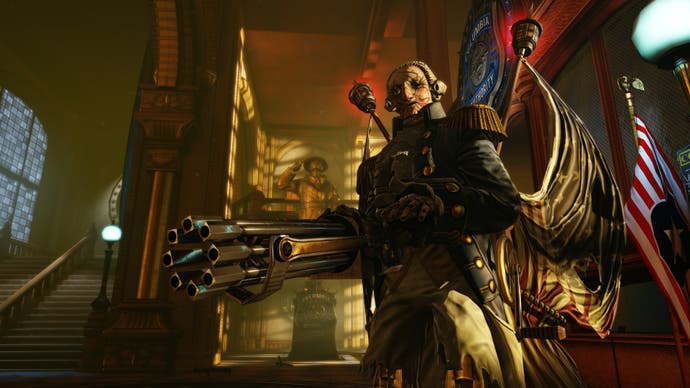
I mention this because throughout our interviews both Holmes and Levine are very cagey whenever I try to link anything in Irrational's games to either a firm opinion or a real-world counterpart - you wouldn't expect anything less, and more power to them. Holmes seems to visibly flinch when I use the word 'satire'. So I ask why maintaining this kind of neutrality is so important, and why he doesn't like that word in Infinite's context.
"To some extent I think that satire, for me at least, tends to conjure up images of almost parody and poking fun. I think what we're trying to do is show people, particularly in the jump from BioShock to BioShock Infinite, that this sort of blind faith in ideology tends to lead to ruin. I think that people's inability to view and argue from all angles means you don't leave yourself anywhere good - you're not able to sort of own your arguments and make a rational case, it's always 'this is what I believe in!' and if anyone contradicts you you're going to smite them out."
And the neutrality? "I think in terms of political statements all we're saying is that ideology tends to be bad," says Holmes, "and I think that if you were to make a political statement on either side, and you're right we're very careful not to do that, that muddies the message right, that muddies the message which is think critically about all aspects of what you believe in. It's not my job to say who is right or who is wrong, I think our job is simply - that's what great art does, it causes debates among different groups of people, and I think ultimately that's what our goal here is. Racism is not the main theme of the game just like religion is not the main theme of the game, as people play it they'll see the sort of evolution.... I don't know if people have really started to crack what the larger theme of Infinite is about, you probably don't really start to see it until closer to the end."
Which, of course, is where we have to close. I've played a chunk of Infinite, but have no idea where it's going - except that, rather than deflating expectations, Holmes does nothing but raise them. "The ending is... is a thing," says Holmes. "My hope is that players come away with a deep respect and understanding for Elizabeth, and hopefully have a willingness to discuss with their friends the ending and the motivation and what it all means in a kind of a Lost sense. But if nothing else, if players walk away feeling like Liz was a true companion for them over the course of the game, we've done one hell of a job."
This interview is based on a trip to Irrational's offices in Boston. Irrational paid for travel and accommodation.
